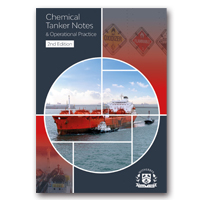제품상세보기
CHEMICAL TANKER NOTES & OPERATION PRACTICE
This publication has been extensively revised and updated by Witherbys to reflect current best practice in chemical tanker operations. This includes updates to procedures and recommendations for cargo carriage as a result of changes to regulatory requirements. These primarily include updates to the the International Code for the Construction and Equipment of Ships carrying Dangerous Chemicals in Bulk (IBC Code) that are now reflected across this publication.
Recent Amendments to the IBC Code
Recent amendments to the IBC Code include amendments to the contents of the model form of the Certificate of Fitness and NLS Certificates that entered into force on 1 January 2020 (Resolutions MSC.440(99) and MEPC.302(72)).
However, the most significant change for chemical tankers in recent years is the revised chapters of the IBC Code and amendments to MARPOL Annex II that entered into force on 1 January 2021 (Resolution MEPC.318(74)). These amendments required the revision and replacement of the ship's existing Certificate of Fitness as well as updates to the ship's P&A Manual. Specifically, these amendments relate to Chapters 1, 15, 16 (Operational requirements), 17 (Summary of minimum requirements), 18 (List of products to which the Code does not apply), 19 and 21 of the IBC Code.
The revision of Chapter 16 introduced prewash requirements, as per paragraph 13.7.1.4 of MARPOL Annex II, for persistent floating substances. This included amendments to the P&A Manual for new procedures relating to the cleaning of cargo tanks with persistent floating substances inside certain regions.
Importantly Chapter 17 now indicates with ?T? in column (k) whether a substance is considered a Toxic substance. Over 200 cargoes were added in 2020 to the cargoes having the ?T? (denoting whether a substance is considered a ?Toxic? substance) in IBC Code column (k). It is also a requirement of the IBC Code that when a ship carries a toxic substance, a vapour-detection instrument must be on board. Many toxic cargoes will also have more stringent requirements to stowage and segregation away from oil fuel tanks, as well as additional requirements for cargo tank relief-valve settings than non-toxic cargoes.
These amendments were required to strengthen discharge requirements for cargo residues and tank washings from ships carrying NLS. The amendments therefore harmonise the list of substances and also upgrade/downgrade the ship type requirements for a number of different cargoes. Furthermore, some cargoes that were listed in Chapter 18 (list of products to which the code does not apply) have moved to Chapter 17 and will no longer be allowed to be carried on ships that do not have the required Certificate of Fitness.
Finally, another recent set of amendments to the IBC Code that are due to enter into force on 1st July 2024 is those in Resolution. MSC.526(106). They relate to survivability and provide exclusions related to those openings fitted with watertight closures for application of the conditions concerning flooding or downflooding.





